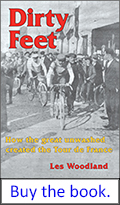

Eric de Vlaeminck
The Greatest Cyclo-Crosser Ever
by Les Woodland

Les Woodland's book Dirty Feet: How the Great Unwashed Created the Tour de France is available as an audiobook here. For the print and Kindle eBook versions, just click on the Amazon link on the right.
Eric de Vlaeminck passed away December 4, 2015 after a struggle with Alzheimer's and Parkinson's.
He was world cyclo-cross champion seven times: 1966, '68, '69, '70, '71, '72 and '73. He missed 1967 because his bike was damaged during the race. Eric was the brother of racing legend Roger de Vlaeminck. De Vlaeminck was also a superb road rider, having won the 1969 Tour of Belgium as well as a stage in the 1968 Tour de France.
As a pro, his behavior after races was erratic, which some blamed on drugs. De Vlaeminck never tested positive, but he was treated for amphetamine addiction. Later in life, he seemed to have brought his demons under control and became Belgian cyclo-cross coach and ushered in a golden age of Belgian cross racing.

Eric de Vlaeminck racing in his world champion's rainbow jersey
Les Woodland visited him years ago and and wrote this remembrance of the greatest cyclo-crosser and perhaps best cyclo-cross coach ever:
So, poor Erik De Vlaeminck is dead. A funny reaction when I heard it. Often riders die and I nod in sadness and recognise the door on their era has blown just a little more closed. But with Erik I felt a greater sadness.
For a couple of years I had this idea of cycling round the continent for Cycling, meeting old stars and having a coffee with them. I was inspired by my old cycling hero, Jock Wadley, who reported from his bike.
Erik’s name came up as a joke. All we knew of him were the wild stories, so many of which turned out to be true or not far-fetched, over his madness under the influence of amphetamines after races.
I remember one of the guys in the office saying “You’ll be lucky to get away without an axe in your back.” A joke but a serious one.
Well, I also wrote now and then for Het Volk, the paper, now gone, which started a rival to the Tour of Flanders after the war. I asked for Stefan Van Laere, whom I knew, and asked what he knew of De Vlaeminck’s toestand. The word means “condition”, as in medical condition.
“Toestand?”, Stefan asked with some astonishment. “He’s fine. He’s the national cyclo-cross coach.”
And indeed he was. The man who won more cyclo-cross championships than any man on earth was training a country to win more cyclo-cross championships than any nation on earth. For a decade, Belgians were unbeatable; sometimes all three rungs were occupied by Belgians. But De Vlaeminck’s involvement hadn’t reached us; all we knew was that he was a head case.
So I called him. The voice on the other end of the line was quiet, not quite timid but gentle. Certainly I could come and see him. When would I like?
I remember arriving at his house in the country, just outside a town on the coast. This particular time, I had gone by car. There were no street lights and Erik walked out to tell me gently that, in Belgium, I had to park facing the direction of the traffic. And, he suggested, I should leave the side lights on.
It was all so gentle, advice for my sake, no hint of bossiness. A touching respect for the law that hadn’t always run through his life.
We got on well. Had life been different, I could imagine him as a friend. His wife, too, darker skinned than the always pale Erik, with long, curled hair. Erik was only two years older than I was, after all.
He wouldn’t talk of his dark days. He was firm, but polite. When I hinted at the subject again, as a side line to another question, he spotted the trap and, just that one time, his eyes narrowed and he was adamant. He wasn’t going to talk about it.
The world already knew, of course. His addiction to amphetamine had been so marked that he sold much of what he owned to buy pills. He was jailed for stealing doctors’ prescriptions. He couldn’t defend his last title because he was in a cell.
He took his life in hand after that, but it was painful and nobody trusted him. He was accompanied when he went to the toilet. His soigneur stood beside him in the showers. The police watched closely.
In the end he recovered. He worked as a dumper driver for the parks department in Eeklo, his home town. The Belgian federation would give him a racing licence only one day at a time. But by then the worst days were over. Erik became national coach and revolutionised training. He didn’t just insist his riders ride; he demanded they fell off. How else were they to lose their fear?
He went to beaches and parks in winter and hijacked children’s slides, getting riders to career down them. He encouraged them to run. And he turned them into unbeatable champions. And always there, when you look at the television coverage now, was a shortish, stocky man with unrestrained hair and a round, almost vacant face. Erik De Vlaeminck.
He was already having problems with the federation when I went to see him. His view was that cyclo-cross was bringing Belgium the medals, all the success. Under him, cyclo-cross became the major end of the sport instead of winter larking about in the mud. Yet all the money and facilities, he said, were going to the road.
I asked him, I thought as a joke, if he’d consider becoming national coach in Britain. He took it surprisingly seriously.
“You think that’s possible?”, he asked.
In the end there was some sort of incident I’m not sure about at a world championship and he was replaced. Perhaps he never recovered from that. He certainly never got over the death of his son in a cyclo-cross.
He was 70 when he died. He’d had Parkinson’s disease and Alzheimer’s for years.
Such a sad end. And I feel an odd loss.
Silent video of de Vlaeminck winning the 1968 world cyclo-cross championship







